14 start with P start with P
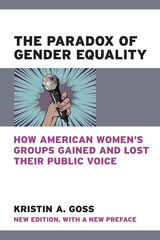
Goss asks what women have gained, and perhaps lost, through expanded incorporation, as well as whether single-sex organizations continue to matter in 21st-century America.
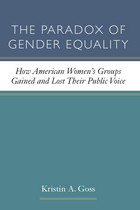
Drawing on original research, Kristin A. Goss examines how women's civic place has changed over the span of more than 120 years, how public policy has driven these changes, and why these changes matter for women and American democracy. Suffrage, which granted women the right to vote and invited their democratic participation, provided a dual platform for the expansion of women's policy agendas. As measured by women's groups' appearances before the U.S. Congress, women's collective political engagement continued to grow between 1920 and 1960—when many conventional accounts claim it declined—and declined after 1980, when it might have been expected to grow. This waxing and waning was accompanied by major shifts in issue agendas, from broad public interests to narrow feminist interests.
Goss suggests that ascriptive differences are not necessarily barriers to disadvantaged groups' capacity to be heard; that enhanced political inclusion does not necessarily lead to greater collective engagement; and that rights movements do not necessarily constitute the best way to understand the political participation of marginalized groups. She asks what women have gained — and perhaps lost — through expanded incorporation as well as whether single-sex organizations continue to matter in 21st-century America.


This book addresses how gender became a defining category in the political and social modernization of Japan. During the early decades of the Meiji period (1868–1912), the Japanese encountered an idea with great currency in the West: that the social position of women reflected a country’s level of civilization. Although elites initiated dialogue out of concern for their country’s reputation internationally, the conversation soon moved to a new public sphere where individuals engaged in a wide-ranging debate about women’s roles and rights.
By examining these debates throughout the 1870s and 1880s, Marnie S. Anderson argues that shifts in the gender system led to contradictory consequences for women. On the one hand, as gender displaced status as the primary system of social and legal classification, women gained access to the language of rights and the chance to represent themselves in public and play a limited political role; on the other, the modern Japanese state permitted women’s political participation only as an expression of their “citizenship through the household” and codified their formal exclusion from the political process through a series of laws enacted in 1890. This book shows how “a woman’s place” in late-nineteenth-century Japan was characterized by contradictions and unexpected consequences, by new opportunities and new constraints.
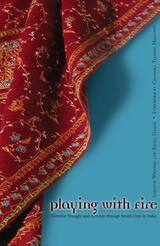
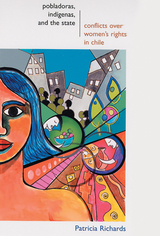
Chile has made a public commitment to equality between women and men through the creation of a National Women’s Service, SERNAM. Yet, indigenous Mapuche women and working-class pobladora activists assert that they have been excluded from programs implemented by SERNAM. Decisions about what constitutes "women’s interests" are usually made by middle class, educated, lighter-skinned women, and the priorities and concerns of poor, working-class, and indigenous women have not come to the fore.
Through critical analysis of the role of the state, the diversity of women’s movements, and the social and political position of indigenous peoples in Latin America, Richards provides an illuminating discussion of the ways in which the state defines women’s interests and constructs women’s citizenship. This book makes important contributions to feminist studies, theories of citizenship, and studies of the intersections of class, gender, and race.
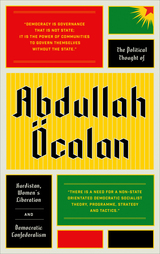
Bringing together Öcalan’s ideas in one slim volume for the first time, The Political Thought of Abdullah Öcalan contains a selection of his most influential writings over his lifetime. These ideas can be read in light of Öcalan’s continuing legacy during the ongoing revolution and the battle against conservatism and religious extremism. As the political situation in Syria intensifies, this book offers a timely and essential introduction for anyone wanting to come to grips with his political ideas on the Kurdish question, gender, Democratic Confederalism, and nationalism.
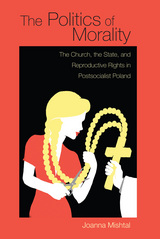
After the fall of the state socialist regime and the end of martial law in 1989, Polish society experienced both a sense of relief from the tyranny of Soviet control and an expectation that democracy would bring freedom. After this initial wave of enthusiasm, however, political forces that had lain concealed during the state socialist era began to emerge and establish a new religious-nationalist orthodoxy. While Solidarity garnered most of the credit for democratization in Poland, it had worked quietly with the Catholic Church, to which a large majority of Poles at least nominally adhered. As the church emerged as a political force in the Polish Sejm and Senate, it precipitated a rapid erosion of women’s reproductive rights, especially the right to abortion, which had been relatively well established under the former regime.
The Politics of Morality is an anthropological study of this expansion of power by the religious right and its effects on individual rights and social mores. It explores the contradictions of postsocialist democratization in Poland: an emerging democracy on one hand, and a declining tolerance for reproductive rights, women’s rights, and political and religious pluralism on the other. Yet, as this thoroughly researched study shows, women resist these strictures by pursuing abortion illegally, defying religious prohibitions on contraception, and organizing into advocacy groups. As struggles around reproductive rights continue in Poland, these resistances and unofficial practices reveal the sharp limits of religious form of governance.
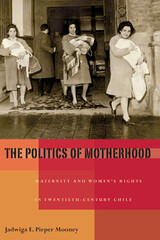
Chronicling an era of unprecedented modernization and political transformation, Jadwiga E. Pieper Mooney examines the negotiations over women's rights and the politics of gender in Chile throughout the twentieth century. Centering her study on motherhood, Pieper Mooney explores dramatic changes in health policy, population paradigms, and understandings of human rights, and reveals that motherhood is hardly a private matter defined only by individual women or couples. Instead, it is intimately tied to public policies and political competitions on nation-state and international levels.
The increased legitimacy of women's demands for rights, both locally and globally, has led to some improvements in gender equity. Yet feminists in contemporary Chile continue to face strong opposition from neoconservatism in the Catholic Church and a mixture of public apathy and legal wrangling over reproductive rights and health.
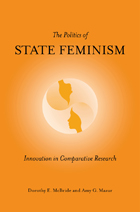
The Politics of State Feminism addresses essential questions of women's movement activism and political change in western democracies. The authors—top gender and politics scholars—provide a comparative analysis of the effectiveness of government agencies and women's movements regarding women’s policy issues—if, how, and why they form a kind of state feminism.
The central research questions are examined across five issue areas in thirteen postindustrial democracies in Europe and North America from the 1960s through the early 2000s. The authors explore a range of topics drawn from contemporary theory, interactions between descriptive and substantive representation, and the place of institutions in democratic change.
Using the innovative qualitative and quantitative methods employed by the Research Network on Gender Politics and the State, the authors have developed a new body of theories about the role of state feminism and how it can help further women’s rights.

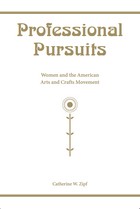
Zipf focuses on five gifted women in various parts of the country. In San Diego, Hazel Wood Waterman parlayed her Arts and Crafts training into a career in architecture. Cincinnati's Mary Louise McLaughlin expanded on her interest in Arts and Crafts pottery by inventing new ceramic technology.
New York's Candace Wheeler established four businesses that used Arts and Crafts production to help other women earn a living. In Syracuse, both Adelaide Alsop Robineau and Irene Sargent were responsible for disseminating Arts and Crafts-related information through the movement's publications. Each woman's story is different, but each played an important part in the creation of professional opportunities for women in a male-dominated society.
<i>Professional Pursuits</i> will be of interest to scholars and students of material culture and of the Arts and Crafts movement. More importantly, it chronicles a very significant, little-understood aspect of the development of Victorian capitalism: the integration of women into the professional workforce.
Catherine Zipf is an assistant professor in the Department of Cultural and Historic Preservation at Salve Regina University. She has published articles in <i>Women's Art News</i> and the <i>Journal of the Society of Architectural Historians</i>.
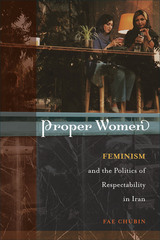
Chubin brings attention to the varying class, ethnic, religious, and national identities of NGO staff and clients that shaped their differing understandings of oppression and justice. Her examination of the tensions within the organization reveals why the efforts of the NGO workers failed to gain purchase among the intended beneficiaries.
Proper Women concludes by encouraging feminist activists to not only examine the role of local politics and transnational connections in shaping their definitions of empowerment, but also consider the advantages of a justice-enhancing practice as opposed to justice monism for their target populations.
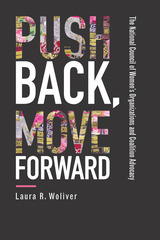
The coalition known as the National Council of Women’s Organizations no longer exists today, but the history and the lessons learned from the NCWO’s activism remain as important as ever—perhaps even more so in this age of Trump. Laura Woliver spent fifteen years doing fieldwork and conducting research and interviews to understand how the NCWO coalition group functioned. The result is her impressive study, Push Back, Move Forward.
Woliver explores the foundational work of the NCWO and member groups to promote women’s economic security, citizen status, and political rights. She investigates women’s access to previously “male only” organizations, such as private clubs; the increase in voter participation generated by measures such as early voting; advocacy campaigns for such benefit programs as Social Security and the Affordable Care Act; and global human and women’s rights activism. In addition, she examines the accomplishments of women of color, both alongside and within the NCWO, who orient their politics toward achieving justice and attaining rights.
Push Back, Move Forward artfully documents this important group’s activities while also gleaning larger lessons about coalition organizations.
READERS
Browse our collection.
PUBLISHERS
See BiblioVault's publisher services.
STUDENT SERVICES
Files for college accessibility offices.
UChicago Accessibility Resources
home | accessibility | search | about | contact us
BiblioVault ® 2001 - 2024
The University of Chicago Press









